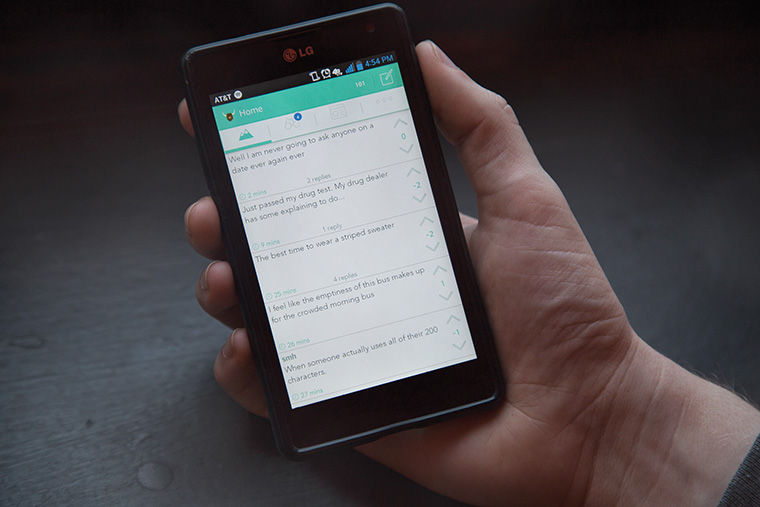Loop students yak, question cyberbullying
Photo Illustraion by Nohemi Rosales
Chicago-area college students are posting every 60 seconds on Yik Yak, a social media platform that allows users to post anonymously on a geolocation-centric feed, said Cam Mullen, the company’s lead community developer.
February 9, 2015
Columbia students are not afraid to yak about their lives.
Yik Yak, a social media platform targeted at college students that allows users to post anonymously on a geolocation-centric feed, is gaining popularity among Chicago-area students who post nearly every 60 seconds, according to Cam Mullen, Yik Yak’s lead community developer.
Using Yik Yak on Columbia’s campus provides a collaborative feed that combines posts from students at neighboring institutions such as DePaul University, Roosevelt University and the University of Illinois at Chicago, causing the feed to be more diverse than those at most other campuses throughout the country, Mullen said.
“Because [Columbia’s feed] … includes not only the students at Columbia College, but some of these other colleges nearby, the content is very diverse,” Mullen said. “What gets up-voted the most in metropolitan Chicago is stuff everyone can identify with. You have [posts] that are relevant to more than just one social group.”
The app, which debuted in January 2013, is used on more than 1,600 campuses nationwide, Mullen said.
Since the app’s inception, it has often been deemed an outlet for cyberbullying, but Mullen said Yik Yak has systems in place to minimize negative behavior on the application. Monitoring posts, filtering racial and homophobic slurs and allowing users to down-vote posts until they are removed from the feed are methods Yik Yak uses to cut down on instances of cyberbullying, Mullen said. To prohibit younger users who are more likely to engage in cyberbullying, Mullen said the company has geo-fenced more than 85 percent of high schools and middle schools across the country, effectively blocking them from using the app.
“These tools are constantly being evolved and they are so much better today than they were six months ago and so much better than they were two months ago,” Mullen said. “We’re trying our hardest to improve these so we can reduce the amount of misuses to as little as possible.”
Ramone Hulet, a senior cinema art + science major and former Yik Yak user, said he initially tried the app because he wanted to feel connected to the campus and interact with students at different colleges. He eventually stopped using the app because he was not finding it to be a valuable social experience, though.
“If you post something, you’re not going to get a response unless it’s super risqué or crazy,” Hulet said. “It’s more like Twitter than a community, which is what I wanted it to be. It let me down.”
Marissa Mrozek, a junior cinema art + science and photography double major, said she finds Yik Yak humorous but dislikes the app because of the many instances of cyberbullying. Noting the sexist and homophobic remarks she has seen, Mrozek said she views Yik Yak as a way for people to be offensive without being held accountable.
“People use Yik Yak to really give their negative opinions on all the major issues that are currently in our society,” Mrozek said. “A lot of people use it to be mean.”
In addition to Yik Yak, Mrozek said she uses the Facebook and Tumblr apps most often and that she sees instances of cyberbullying on those platforms as well.
“I think [cyberbullying] is something that is always going to happen,” Mrozek said.
Mullen said the app is well-liked among college students despite concerns that the anonymity the app provides can be hurtful and problematic.
“One of our missions is to provide a voice to those who might not otherwise [have one],” Mullen said. “The reason people really like Yik Yak is that it creates a sense of community and belonging. Content is key, and the playing field is equal.”








